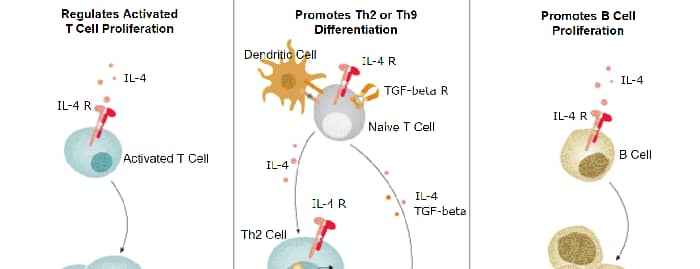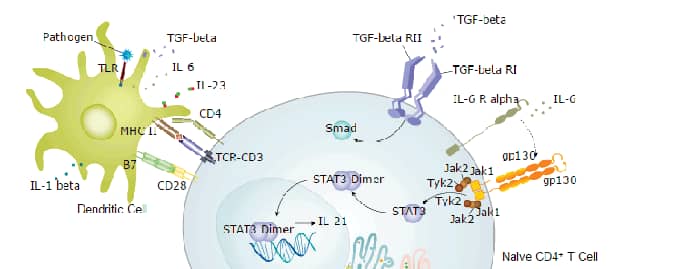Recombinant Mouse TGF-beta RII/(human) Fc Chimera, CF Summary
Product Specifications
| Mouse TGF-beta RII (Ile24-Asp184) Accession # Q62312.1 | IEGRMD | Human IgG1 (Pro100-Lys330) |
| N-terminus | C-terminus | |
Analysis
Product Datasheets
532-R2
Carrier Free
CF stands for Carrier Free (CF). We typically add Bovine Serum Albumin (BSA) as a carrier protein to our recombinant proteins. Adding a carrier protein enhances protein stability, increases shelf-life, and allows the recombinant protein to be stored at a more dilute concentration. The carrier free version does not contain BSA.
In general, we advise purchasing the recombinant protein with BSA for use in cell or tissue culture, or as an ELISA standard. In contrast, the carrier free protein is recommended for applications, in which the presence of BSA could interfere.
532-R2
| Formulation | Lyophilized from a 0.2 μm filtered solution in PBS. |
| Reconstitution | Reconstitute at 100 μg/mL in sterile PBS. |
| Shipping | The product is shipped at ambient temperature. Upon receipt, store it immediately at the temperature recommended below. |
| Stability & Storage: | Use a manual defrost freezer and avoid repeated freeze-thaw cycles.
|
Background: TGF-beta RII
Most cell types express three sizes of receptors for TGF-beta. These are designated Type I (53 kDa), Type II (70 - 85 kDa), and Type III (250 - 350 kDa). The Type III receptor, a proteoglycan that exists in membrane-bound and soluble forms, binds TGF-beta 1, TGF-beta 2, and TGF-beta 3 but does not appear to be involved in signal transduction. The Type II receptor is a membrane-bound serine/threonine kinase that binds TGF-beta 1 and TGF-beta 3 with high affinity and TGF-beta 2 with a much lower affinity. The Type I receptor is also a membrane-bound serine/threonine kinase that apparently requires the presence of the Type II receptor to bind TGF-beta. Current evidence suggests that signal transduction requires the cytoplasmic domains of both the Type I and Type II receptors.
The recombinant soluble TGF-beta Type II receptor is capable of binding TGF-beta 1, TGF-beta 3, and TGF-beta 5 with sufficient affinity to act as an inhibitor of these isoforms at high concentrations. The soluble receptor also binds TGF-beta 2, but with an affinity at least two orders of magnitude lower. Binding of TGF-beta 1, TGF-beta 3, and TGF-beta 5 to the soluble TGF-beta Type II receptor can also be demonstrated by using the soluble receptor as a capture agent on ELISA plates and this observation has been used as the basis for the development of immunoassays for these isoforms of TGF-beta.
Citations for Recombinant Mouse TGF-beta RII/(human) Fc Chimera, CF
R&D Systems personnel manually curate a database that contains references using R&D Systems products. The data collected includes not only links to publications in PubMed, but also provides information about sample types, species, and experimental conditions.
4
Citations: Showing 1 - 4
Filter your results:
Filter by:
-
Mechanisms of immune suppression exerted by regulatory T-cells in subcutaneous AE17 murine mesothelioma.
Authors: Kissick HT, Ireland DJ, Greay SJ, Beilharz MW
J. Interferon Cytokine Res., 2010-09-13;30(11):829-34.
Species: Mouse
Sample Types: In Vivo
Applications: In Vivo -
Partial inhibition of integrin alpha(v)beta6 prevents pulmonary fibrosis without exacerbating inflammation.
Authors: Horan GS, Wood S, Ona V, Li DJ, Lukashev ME, Weinreb PH, Simon KJ, Hahm K, Allaire NE, Rinaldi NJ, Goyal J, Feghali-Bostwick CA, Matteson EL, O'Hara C, Lafyatis R, Davis GS, Huang X, Sheppard D, Violette SM
Am. J. Respir. Crit. Care Med., 2007-10-04;177(1):56-65.
Species: Mouse
Sample Types: In Vivo
Applications: In Vivo -
Retinal neurons regulate proliferation of postnatal progenitors and Muller glia in the rat retina via TGF beta signaling.
Authors: Close JL, Gumuscu B, Reh TA
Development, 2005-07-01;132(13):3015-26.
Species: Rat
Sample Types: In Vivo, Whole Cells
Applications: Bioassay, In Vivo -
Thrombospondin plays a vital role in the immune privilege of the eye.
Authors: Zamiri P, Masli S, Kitaichi N, Taylor AW, Streilein JW
Invest. Ophthalmol. Vis. Sci., 2005-03-01;46(3):908-19.
Species: Mouse
Sample Types: Whole Cells
Applications: Bioassay
FAQs
No product specific FAQs exist for this product, however you may
View all Proteins and Enzyme FAQsReviews for Recombinant Mouse TGF-beta RII/(human) Fc Chimera, CF
There are currently no reviews for this product. Be the first to review Recombinant Mouse TGF-beta RII/(human) Fc Chimera, CF and earn rewards!
Have you used Recombinant Mouse TGF-beta RII/(human) Fc Chimera, CF?
Submit a review and receive an Amazon gift card.
$25/€18/£15/$25CAN/¥75 Yuan/¥2500 Yen for a review with an image
$10/€7/£6/$10 CAD/¥70 Yuan/¥1110 Yen for a review without an image





